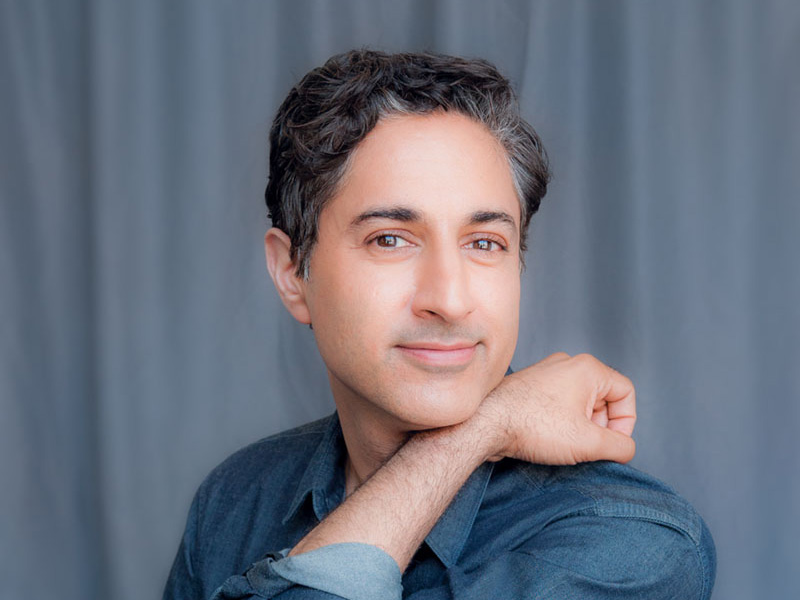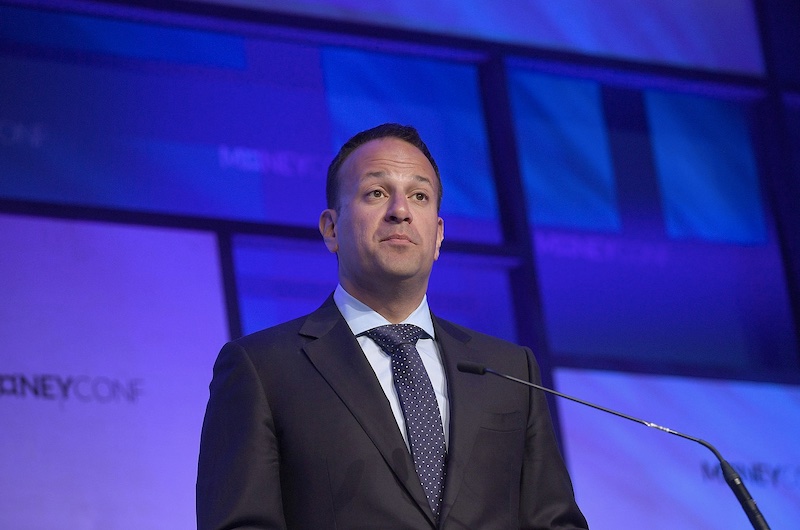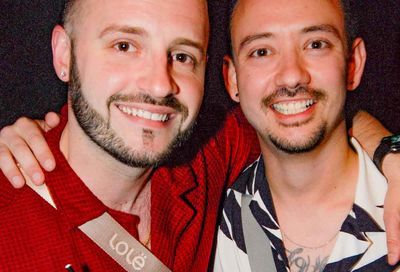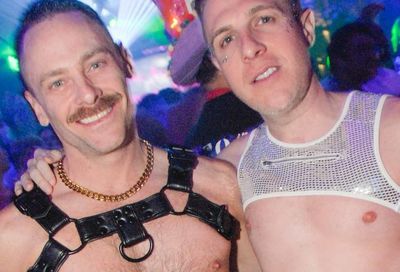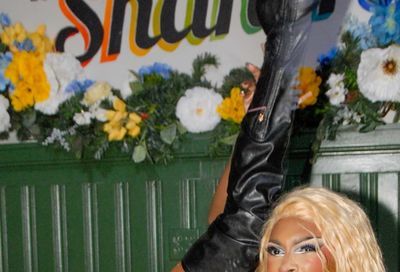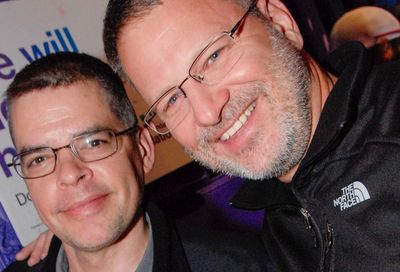#BlackLivesMatter: Alicia Garza on privilege, justice and founding a movement

“My first experience with interpersonal racism was in the fifth grade,” says Alicia Garza. “A teacher commented that the palms of my hands were so much lighter than the tops, and wondered whether the bottoms of my feet were the same.”
Garza, a co-founder of Black Lives Matter, was keenly aware of race growing up. The daughter of a white father and black mother, as a young child in the San Francisco Bay area she took notice of how differently society treated her parents based on their skin color. It was a treatment — an institutionalized racism — that Garza would eventually be subjected to.
“I had taught myself to read at 3 years old,” she says. “And my mom was trying to get me into preschool or early kindergarten. She had a hard time getting me in as a little black girl, because there was disbelief that I could read and hold my own. That was persistent throughout my school career. My mom pushed to try and get me into Advanced Placement classes, and even though I had passed the test, there was a lot of hesitancy on the part of teachers and administrators. There was an assumption that, because I was black, I wouldn’t be able to achieve in those spaces.”
A social justice activist who cut her teeth working on issues related to housing and gentrification, Garza now organizes domestic workers. Her longtime advocacy on behalf of low-income communities of color has not only informed her political ideology — which she characterizes as “a little left of progressive” and “radical” — but has contributed to a deeper understanding of the interplay between race, power and privilege. Through her work and personal experience, Garza became increasingly frustrated by the lack of progress on racial justice issues. That frustration boiled over in 2013.
After the acquittal of George Zimmerman in the shooting death of teenager Trayvon Martin in Sanford, Fla., Garza took to Facebook, penning a post titled, “A Love Note to Black People.” It called on African Americans to fight the societal biases and various forms of structural and institutional racism that devalue their lives. She concluded with, “Our Lives Matter, Black Lives Matter,” a phrase that became the moniker for the movement she launched, along with Patrisse Cullors and Opal Tometi, to help black people change the unacceptable status quo.
“I was really impacted with what happened with Trayvon Martin, not because it was the first time that I had ever heard about or been involved in a movement around police brutality, but because I was tired — like, really exhausted — of all of these different ways in which black folks are portrayed as being thugs and criminals and animals,” she says.
“Living in Oakland, right before Trayvon was killed, Oscar Grant was killed just a few blocks from my house,” she continues. “A young man was murdered on the new train system that they put through the largest remaining black community in San Francisco. He was murdered in cold blood, in the daytime, by police, and people saw it. He was running from the police, because he had been approached by officers about proof of payment for the transit system. That fare is $2. He lost his life over two dollars.”
Garza says all of these horrific instances “laid the foundation for me. It’s what motivated me to stay active in the movement, and what motivated me to write that Facebook post that eventually became a real moniker for a broader movement around not just police brutality, but the sanctity of black lives.”
METRO WEEKLY: Let’s start with your childhood.
ALICIA GARZA: I was born and raised in the Bay Area, in California. And I like to say I’m a little bit of a unicorn, because there’s not many people now that live in the Bay Area who were born and raised there, due to market forces and all kinds of things. My upbringing in a pretty progressive place definitely shaped my political thinking and my political experiences. I went to local middle schools and high schools in Marin County, and went to college at UC-San Diego. Then I moved back to the Bay Area to live and work. I’ve been organizing locally for about 13 years.
MW: How did you get into that?
GARZA: College was really when I got exposed to social justice work. I became involved in student-led initiatives to increase the number of students of color on campus, to raise awareness around the experiences of women of color on campus, and so it was a natural fit that, as I left, I would pursue something similar to that.
My first entrée into organizing was participating in a program called the School of Unity and Liberation. They did a program where they would take young people who wanted to learn how to organize in their communities, and put them through an eight-week internship, where you would actually do organizing work in a local community organization, and then twice a week do seminars. You’d learn about social movement history, and you also learned about the mechanics of organizing.
MW: And what issue did you work on?
GARZA: I was working at Just Cause Oakland, which was newly formed at the time, and had just won a really badass tenant protection measure that prevented no fault eviction. So we were doing door-knocking in East and West Oakland, and organizing Oakland residents — particularly low-income residents of color — around the impending issues that were involved in the gentrification of the community.
MW: What do you do for your job now?
GARZA: I work with the National Domestic Workers Alliance, which is powered by more than 54 membership-based organizations. We organize domestic workers. So, women who clean homes, who take care of other people’s children, who provide elder care, and who support people with disabilities. My specific role is special projects director — I lead our work at the intersections of race, gender, and the economy, and our democracy. I helped spearhead a new initiative called “We Dream in Black,” a leadership development and capacity-building program for black domestic workers from across the diaspora. So that means black American women workers, Caribbean workers, and African immigrant workers. Together, we are strengthening the organizations that they lead, and we are also starting new chapters in places where there are high concentrations of black domestic workers, but very few organizations that are actually organizing them.
MW: How do you identify within the LGBT spectrum?
GARZA: I identify as queer.
MW: When did you first know that something was different about you, that you weren’t heterosexual?
GARZA: [Laughs.] I became most comfortable expressing my own self in my later years in college, as I started to become exposed to more people, build a wide range of relationships, and also I think just the process of getting older, starting to be more comfortable in your own skin, is also somewhat helpful.
MW: When did you officially come out to your family?
GARZA: It was when I met my current partner. We’ve been together for, let’s see, I think it’s 12 years this year. And I don’t know, when we met, we were instantly tight. We were friends for a while, and when that transitioned from a more platonic relationship into a romantic one. My family was really, really supportive. I feel grateful that they didn’t process with me all of the things that they were probably going through, and instead, just made it very comfortable, and very positive. I feel very lucky, because I know that that’s not always the norm.
MW: Talk a bit bit about the intersections of race and sexuality as they’ve played out in your life.
GARZA: I think my experiences organizing inside of poor and low-income communities in the Bay Area, which were largely black and Latino — and some Southeast Asian, actually — really built the foundation for what eventually became Black Lives Matter. Patrisse and I both worked in community-based organizations that had relationships to each other, and that’s actually how we met. One of the ways we bonded was over being a part of a social justice movement that is still, by and large, hetero male-led.
I also think the experience of organizing in poor and working-class black communities, seeing the ways in which our communities are physically segregated — from resources, from activities, from amenities — and also seeing the ways that police interact in those communities was very formational. As somebody who grew up in Marin County, I can tell you that the way police interact with communities there, particularly white communities, is very, very different than the way they interact with communities in West Oakland, or East Oakland, where I live now. This is not stuff that’s in people’s heads, and you’re not really protected from it, no matter how much wealth you have access to.
MW: When did you realize that Black Lives Matter could be a larger movement?
GARZA: We were just noticing that this thing that we put out was gaining traction. And we started to think about what the possibilities could be. We really felt like it wasn’t enough for this thing to live online. Online things come and go, people are bombarded with all kinds of information all the time. And social media, in and of itself, is meant to be a way to connect people to do something.
We thought that we could experiment, as organizers, with what it meant to connect people online, so they could do stuff together offline. In particular, we really wanted to create space for new narratives of black life, and what that meant. We wanted to create space for people who are looking for a way to get involved and looking for other people to do that with, who maybe weren’t part of formal organizations, or maybe even never considered themselves to be political until this particular moment. And we also wanted to create space to talk about what a new black radical politic could look like in real time — recognizing that a lot of our political framework has been shaped by generations of black radical tradition.
It’s not necessarily something new that we’re doing, but it is a new context. It’s not the 1970s, it’s not the 1980s, it’s not even the 1990s. This is a really different political moment, when we’re trying to understand what it means to build black power, in the era of the first black president, in an era when we have more black elected officials, and CEOs, and corporate heads than we’ve ever had in our history as a nation.
MW: There’s a misperception or deliberate mislabeling of Black Lives Matter as a movement that is an inherently anti-police movement. How do you respond to that?
GARZA: So here’s the thing: This narrative that Black Lives Matter is anti-police is actually ridiculous. And there’s a lot of other ridiculous narratives out there about Black Lives Matter, despite the fact that we’ve written really extensively about who we are and what we believe. And despite the fact that we’ve said, many, many times, that this is not a movement that is solely focused on police violence, nor is it a movement that is anti-police.
I think it’s ironic that we would be framed in that way, when really what we’re talking about and fighting against are police who are fundamentally being covered for taking lives. We’re talking about a system of policing that has developed a culture that is largely unaccountable, not transparent, and corrupt. And it’s not a question of good cops or bad cops, because the institution of police itself supports bad behavior. So even good cops, in a bad context, become bad cops.
This isn’t about people being good or bad — it’s about whether or not the structure that we’ve created for safety, and for justice, is actually playing the functions that we wanted it to. And I think what the movement is saying, and what our network is saying, is that it’s not. The gap between keeping people safe and our current system and structures of policing is so wide that we’re not clear that it’s able to be reformed. That’s not personal.
I think where the personalization of that narrative comes from is a corrupt culture of policing. We know police unions, in particular, take a really large role in reshaping and reframing conversations that have to do with transparency or accountability, whether it’s about Black Lives Matter or not. Unions have been corrupting the narrative around what it would mean to have accountable policing, way before we were even on the scene. People who have been doing this work for a long time can testify to that.
The other piece is that the conservative right — which has consolidated power in this country, by and large — gains its support from how afraid people are of each other. When we look at the presidential debates, for example, there’s so much rhetoric around who’s a threat to you, who’s a threat to your well-being, who’s a threat to your ability to survive, who’s a threat to the ability of this country to be as powerful as it is. All of their language is about threat and fear. Even on the Democratic side. Let’s be clear: This isn’t limited to Republicans, but given our political context, certainly it is the result of a very successful right-wing conservative movement that has been working to consolidate power at the local level, at the state level, and at the federal level for more than 30 years.
We believe that it’s important to engage in the battle of ideas, because our people’s lives depend on it. But we don’t have time to go tit-for-tat with a movement that wants to unravel every gain that our ancestors fought for. Our focus is making sure that we bring more and more people into the fight — not just black people, but people from all walks of life and all types of backgrounds — not just for the sanctity of black lives, but for the reclamation of the ideals that this country was based on.
MW: In the current political climate, the one who’s stood out the most on the Republican side has been Donald Trump, who’s attacked Black Lives Matter verbally. People of color have even been escorted from his rallies in a violent manner. What do you feel when you hear people talk about the fear of the “other”?
GARZA: Honestly, I feel sorry for them. I feel compassion that, at some point, something didn’t click. It’s really basic that this is not a movement that’s about hate or fear or division or separation. What powers and fuels this movement is a deep, profound love, not just for each other, but for humanity. So when there’s rhetoric that tries to reframe who we are and what we’re about — and to me, specifically, since I wrote that letter talking about how much I love black people — I don’t get mad.
I have a lot of compassion that we’re incredibly susceptible to narratives that we may not understand what their motives are. This was the very reason that we try to do a lot of communicating about who we are and what we believe, and what we think people can do to change the world that we live in. We try to do that with a lot of love, a lot of compassion, a lot of empathy, and a lot of desire for connection. And the reality is that we know that not everybody is going to be won over. But we’re going to keep trying to build the broadest front possible that will help us win justice for all of us.
MW: One of the things that’s so interesting is that when you talk about privilege, there’s a tendency for people to get their guard up, and say, “I’m not privileged, I grew up in a small hut in Appalachia and I ran 10 miles in the snow to school, and —
GARZA: [Laughs.] — carrying 15 books, with no backpack —
MW: — and I worked 50 hours a week, or had four jobs, and I’m not privileged. And if people would just work harder and stop asking the government to bail them out, this would all be better.” We hear that a lot — people get their guard up when they’re called out on privilege.
GARZA: I think our understanding of privilege, in this context, is also really closely related to how we understand race and racism. And unfortunately, we live in a political context where racism has come to not be seen as structures and policies and practices that are both seen and unseen, but gets watered down to bad interactions with other people. So it’s essentially, “I’m not racist, because I’m not mean to people,” or “I’m not racist, because I don’t see color,” or “I don’t have privilege, because I don’t think I’m better than anybody else.” These are very rudimentary understandings of how society actually works. You can think about it as an iceberg: There’s the thing you see above the water, but the thing that’s the most dangerous is the thing that’s under the water, because you don’t see it.
I think that whole misunderstanding of race, power and privilege has also been a very concerted effort by a very well-organized right-wing movement. Their whole gusto is derived from the Black Power Movement and the Civil Rights Movement, where, essentially, they’ve redefined race and privilege as being “politically correct.” They’ve reframed race to say, “We no longer have a race problem” — that people, if they don’t have, it’s a function of their own individual failings, as opposed to societal or systemic failings. Even some people of color have adopted those narratives, even though that’s not their actual experience. So we can point to people like Stacey Dash, we can point to people like Raven-Symoné, we can even point to people like Bill Cosby, who perpetuate these narratives that black people are inherently deficient. And they will hold themselves up as exceptions to the rule, because that’s how it works. But, by and large, what the Right has been really good at is generating this fear of the disappearance of whiteness, and has done a really good job of masking where privilege lies.
All white people have privilege, but it doesn’t mean that all white people have the same amount of privilege, or the same degree of privilege. And privilege is really just “access.” You can get access based on your skin color, but be really poor and be from Appalachia, but in a different context. Because you’re white, you have access to opportunities and resources and assets that a person who’s not visibly white doesn’t have. And there’s been millions and millions of studies that lay this out. You can be a white person who’s part of another marginalized or disenfranchised group, like you could be a white gay person, and still have privilege, and also still experience oppression.
The point is not to segment us based on all these different identities, but to ask ourselves, “Well, who does this benefit?” Because, ultimately, even though white people in this country — and really, around the damn world — have privilege at the expense of people of color, and black people specifically, it also doesn’t benefit white people for that social norm to continue.
There’s lots of ways that poor white people are screwed by white supremacy, or are screwed by racism. And part of it is not being able to find common cause with people who are being screwed in the same way that you’re being screwed. It allows us to mask the dynamic and the power dynamics, in particular, of wealth being consolidated into the hands of very few people. Increasingly, it takes away what should be a natural solidarity between people who are also struggling to make a living, or who are also struggling to be their full selves.
MW: What causes that division?
GARZA: I attribute that to a very well-organized machine that has permeated not only our politics, but also our educational systems, our media institutions, our faith-based institutions. They have been very deliberate and powerful in consolidating power that helps to shape our opinions, our thoughts, and our relationships.
MW: If white people are genuine about wanting to stand in solidarity with those suffering from oppression, how do we demonstrate it?
GARZA: Well, I think the first way is by acknowledging that privilege exists. And doing that as a white person is actually pretty powerful. Because part of what becomes so polarizing is what happens when white folks deny the existence of something, which is our lived experience. So there’s that. And then the other piece, I think, is to have conversations with other white people about white privilege and white supremacy — not just historically, but really investigating how it plays out today. That is also a very important task, because it’s not available to everybody. I can talk to white people until I’m blue in the face, and I do. I do that a lot. But the reality is we all share the same experience. And what we may be talking about, it may be more comfortable to ask questions, to make mistakes, to say the wrong thing, to somebody who’s sharing a similar experience as you.
So it’s really important for that organizing to take place in white communities. And there are organizations and individuals that are doing a real model job of that. You’ve got the World Organizing Project, which has been doing a lot of very powerful work in Oregon, especially, during this federal occupation, and organizing white people around that. You have groups like the Catalyst Project, in San Francisco, that trains young white people to be organizers in working-class white communities. You have organizations like Resource Generation, which is working with people who have wealth to redistribute that wealth in a way that’s equitable and pursues the path of social justice. You also have groups like Showing Up for Racial Justice, which is one of the newer groups on the scene, that has been building chapters around the country of white, anti-racist folks who want to stand in solidarity with the movement. But you don’t have to be part of an organization to be part of the movement.
Another thing you can do is vote your values. We know that when we turn on the TV and watch these debates, that there are a certain group of candidates that are really appealing to white voters who are scared of demographic change, who are afraid of the movement that is building right now. And the way to stand in solidarity with the movement is to vote around justice and equality, and an end to oppression overall. There are some clear choices on how to do that. It’s not just about people we’re electing, but it’s also about initiatives.
The other thing you can do as a white person, or as a person of privilege, is talk to your family and talk to your friends. It’s really important that these conversations are happening on multiple levels, in multiple places, where real people — who don’t have access to academies or whatever — can have a real conversation about the state of our country and the state of our world, and really start to make commitments to each other about what kind of world we want to live in and how we’re going to practice that.
Another thing you can do is show up for this movement by being a part of it. That could mean giving resources, that could mean showing up at protests and demonstrations, that could mean writing letters to the editor and sending your opinion into newspapers and into blogs, and where people can see it. Because part of what we have to do is show that this isn’t going to happen on our watch, and we have to show, at some point, that this is an outdated way of being, and that we all want something better. So any place where we have the opportunity and the access to move that narrative, it’s really important and it’s really impactful.
MW: How do you translate Black Lives Matter’s various actions into a form where the movement can effect change politically?
GARZA: Well, first and foremost, among the network there is great diversity in terms of people’s preferred strategy to get where we want to be. That’s not just characteristic of our network, but of any social movement that has existed. If we were to look at the Civil Rights Movement, not everybody thought that pursuing legislation was the way to go. It was actually the interplay between the people who did not want to work in that arena, and the people who did, who created the outcomes that we have.
I think our task as a movement is to figure out how all of those different strategies relate to each other. Because what we’ve seen is, we know we have the power to create space for change to happen. If it wasn’t for this movement, we wouldn’t have presidential candidates talking about whether black lives matter. We wouldn’t talk about presidential candidates having platforms on racial justice and criminal justice. We wouldn’t have 40 new laws passed in 26 states in a period of one year around criminal justice. We wouldn’t even have bipartisan criminal justice reform happening at the federal government. We wouldn’t have the Congressional Black Caucus taking on, as a priority, criminal justice reform.
You and I wouldn’t even be having this conversation. We wouldn’t be having conversations around respectability politics, we wouldn’t be be talking about white supremacy, even. A lot has changed. And what we’re looking at now is, how do we take all of these different strategies that people are employing to create change, and weave them into a quilt that will cover all of us, but that doesn’t require all of us to be doing the same thing. And that is really our task and our charge for the next period.
MW: When we talk about representation, a lot has been made about the Oscars, and the invisibility of people of color when it comes to being recognized for their work. How have you reacted to the idea of a boycott of the Oscars?
GARZA: My take on it is that this isn’t new. But it is exactly this movement that has created space for this conversation to happen. You know, the Oscars has been really white for a very long time. I think it’s a really great example of how systemic racism plays out. The utter lack of people of color, who are being recognized for their work, in an industry that we shape pretty profoundly, is a basic example of how racism works. And what I feel inspired by are people like [independent filmmaker] Ava DuVernay [Selma], who makes it her business — whether she is acknowledged or not — to make sure she is casting talented black actors. To make sure she has black production teams, and women on her team, and all of the people who are excluded regularly. She makes it a point to ensure that level of talent is included in all of her productions.
It’s important to call out what’s happening at the Oscars, but it’s also important to create our own things. Ultimately, we don’t control the Oscars, but there are millions and millions of dollars being made off this industry, and some of the same people who are complaining — and rightfully so — about how white the Oscars are, also have leverage and resources to do things differently. I hold up Ava as an example, because imagine how powerful it would be if Will Smith followed suit, if Jada Pinkett followed suit, if Chris Rock followed suit. These are major heavy-hitters in the industry. If they were to create their own spaces, or create environments that they wanted to see, it would actually have a lot of traction, and would force the contradiction even more. I hope that that’s the next step for this conversation.
For more information about Black Lives Matter, or to learn about upcoming actions, visit blacklivesmatter.com.
Support Metro Weekly’s Journalism
These are challenging times for news organizations. And yet it’s crucial we stay active and provide vital resources and information to both our local readers and the world. So won’t you please take a moment and consider supporting Metro Weekly with a membership? For as little as $5 a month, you can help ensure Metro Weekly magazine and MetroWeekly.com remain free, viable resources as we provide the best, most diverse, culturally-resonant LGBTQ coverage in both the D.C. region and around the world. Memberships come with exclusive perks and discounts, your own personal digital delivery of each week’s magazine (and an archive), access to our Member's Lounge when it launches this fall, and exclusive members-only items like Metro Weekly Membership Mugs and Tote Bags! Check out all our membership levels here and please join us today!




